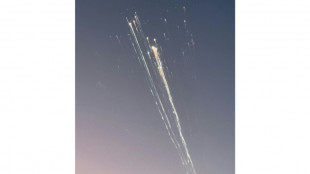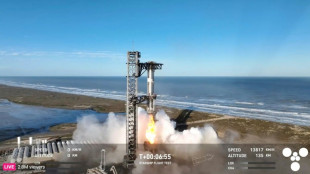

Fly me to the Moon: Firms lining up lunar landings
Japan's ispace on Wednesday became the latest company to try, and fail, at a historic bid to put a private lunar lander on the Moon.
Only Russia, the United States and China have made the 384,000-kilometre (239,000-mile) journey and landed safely on the Moon's surface.
Here are some of the companies who have made the journey, or plan missions soon:
- SpaceIL -
In February 2019, the 585-kilogram Beresheet lander launched from Earth on a Falcon 9 rocket belonging to Elon Musk's SpaceX company.
The lander was a joint project between Israeli non-profit SpaceIL and state-owned Israel Aerospace Industries.
Beresheet, meaning "Genesis" in Hebrew, was carrying an Israeli flag, a time capsule with Israeli historical and cultural data, and various instruments to collect data.
It was described as the world's first spacecraft built in a "non-governmental mission" and successfully reached lunar orbit about six weeks after launch.
But the $100 million mission ended in disappointment in April 2019 when the craft crashed into the lunar surface.
"We are on the Moon, but not in the way we wanted," a staffer was heard saying during a live control room broadcast.
SpaceIL plans to launch Beresheet2 in 2025.
- ispace -
Japanese start-up ispace, like SpaceIL, grew from the Google Lunar XPrize, which in 2010 offered $30 million in awards to encourage scientists and entrepreneurs to dream up low-cost Moon missions.
The prize expired without a winner, but several contestants forged ahead, seeking private funding.
The company sent its Hakuto-R Mission 1 lander into space in December and reached lunar orbit in March.
It was carrying two lunar rovers, one Japanese and one belonging to the United Arab Emirates.
It had been due to land on the lunar surface on Wednesday, but communications were lost after it began its descent and ispace later concluded it had likely crashed.
The company is already developing two further lunar missions, the first of which could launch as soon as next year.
- Intuitive Machines -
Texas-based Intuitive Machines, founded in 2013, aims to launch its Nova-C lander as soon as this June.
The lander will carry five NASA payloads, as well as cargo from private companies, and is intended to gather data on subjects like the effect of space weather on the Moon.
On board will be sculptures by American pop artist Jeff Koons called "Moon Phases" that are intended to be left permanently on the lunar surface.
It will also be equipped with an "EagleCam" that is designed to allow "the first-ever third-person picture of a spacecraft making an extraterrestrial landing" -- in other words, a lunar selfie.
- Astrobotic -
Astrobotic, another one-time Google Lunar XPrize contender, is based in the US city of Pittsburgh and is targeting a Moon landing with its Peregrine lander.
It plans to send the boxy lander -- standing 2.5 metres across and nearly two metres high -- into space on a United Launch Alliance rocket from Cape Canaveral, Florida.
Its earliest launch date is currently May 4, a conveniently symbolic date that references the famous Star Wars line: "May the force be with you."
It will be carrying a range of instruments, mementos and payloads from six countries, including a rover developed by students at Carnegie Mellon University and a plate with a copy of the first block of Bitcoin ever mined.
- Further ahead -
Both Intuitive Machines and Astrobotic are part of NASA's Commercial Lunar Payload Services -- a programme to hitch rides to the Moon with private companies.
Other participants include Firefly Aerospace, which plans a lunar landing carrying NASA payloads in 2024.
A.Fernández--ESF




